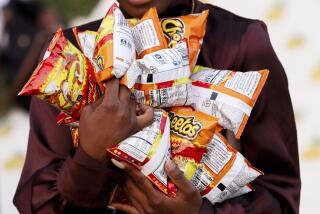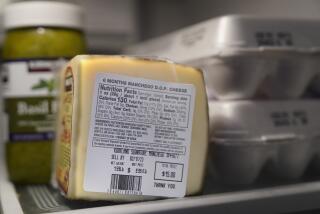Hate-Filled Groceries Called Disturbing Trend
- Share via
WASHINGTON — For Thanksgiving dinner last year, David Burris decided to make strawberry cheesecake for dessert. Opening a box of cake mix, the Baker City, Ore., businessman found a slip of paper that he thought at first was a coupon.
But a closer look gave him a rude shock. The paper was inscribed with a Nazi swastika and hate-filled racial slurs against African Americans.
Burris is one of hundreds of consumers nationwide who in recent years have found offensive leaflets inserted into packages of goods ranging from cereal to frozen pizzas to toilet paper. The propaganda has included graphic depictions of late-term abortions, racist tracts and anti-immigrant leaflets.
On Wednesday, a Senate Judiciary subcommittee held a hearing on proposed legislation that would make putting such information into packaged goods illegal. The Product Package Protection Act would reinforce existing laws against food tampering and place stiff penalties on vandals who deface product packaging.
Sen. Herbert Kohl (D-Wis.), who introduced the bill last week to address what manufacturers see as a “continuing problem,” said the distribution of obscene material is a disturbing trend. California and New Jersey are the only two states that have passed laws criminalizing such acts of tampering, according to Kohl’s office.
“Too many Americans have recently opened groceries and found offensive, racist, anti-Semitic, pornographic and hateful leaflets,” Kohl said.
Burris, who testified before the Senate panel, agreed, saying he initially thought “this might be some sort of joke. But I realized it wasn’t. If [such information] can be inserted [inside of a box], what can these people do to the product?”
According to the Grocery Manufacturers of America, consumers lodge from 200 to 500 complaints a year about objectionable literature or propaganda they find inside packaged products. In most of those cases--including Burris’--the material is placed between the outer cardboard packaging and the sealed goods inside.
Peter Cleary, spokesman for the grocers’ group, estimated in an interview that for every complaint his organization receives, as many as 50 other consumers may have encountered similarly tampered packages but did not report them.
Kraft Foods North America has received 80 complaints of tampering since 1997. General Mills has documented an additional 25 cases a year, and Kellogg’s reports many more.
Kohl’s bill would prohibit the placement of any writing or other material inside a product without the manufacturer’s permission. Penalties would include a fine of up to $250,000 per offense and up to three years in prison.
More to Read
Eat your way across L.A.
Get our weekly Tasting Notes newsletter for reviews, news and more.
You may occasionally receive promotional content from the Los Angeles Times.










